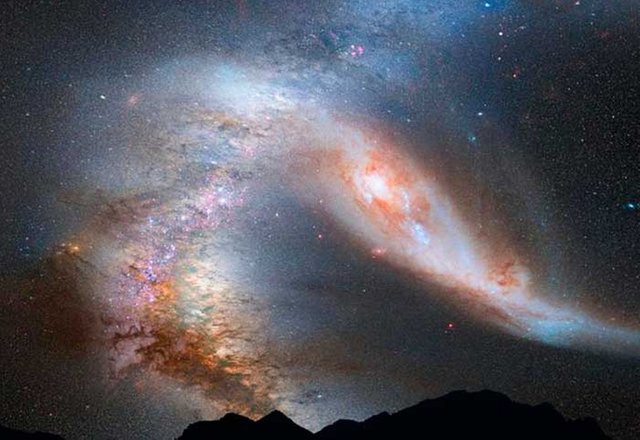They reveal the size of Andromeda and the earth is out of danger

When it comes to galaxies and situations that refer to the Milky Way , scientists and researchers emphasize that, because we can be related. In a surprising discovery, astrophysicists have revealed that the Andromeda galaxy is almost the same size as the Milky Way and no bigger as it was estimated.
Both the Milky Way and the Andromeda galaxy (M31) are giant spiral galaxies in our local universe. And in about 4,000 million years, they will collide in a gravitational sumo combat that will eventually unite them forever. In the light of this new discovery means that, when the two galaxies are merged, the Milky Way will not be consumed by the Andromeda galaxy as suggested by previous models.
Because astronomers previously thought that Andromeda was up to three times more massive than the Milky Way , they expected our galaxy to be absorbed by our larger neighbor, but it seems we had overestimated our opponent.
Calculating the mass
Experts led by astrophysicist Prajwal Kafle they found that the mass of the galaxy of Andromeda is around 800,000 million times the mass of the sun. So our nearest galactic neighbor has roughly the same size as the Milky Way (700,000 million times the mass of the Sun). This finding places the two galaxies, separated by a distance of approximately 2.5 million light years, at par in terms of size.
To determine the size of the galaxy of Andromeda , the team used a technique that calculates the speed required for a fast moving star escape from the gravitational pull of its host galaxy. This required speed required for ejection is known as the escape velocity of an object.
"When a rocket launches into space , it launches with a speed of 11 km / s to overcome the gravitational attraction of the Earth Our galaxy, the Milky Way , is more than a billion times heavier than our little planet Earth , so to escape its gravitational attraction we must launch it with a speed of 550 km / s, "explained Kafle.
Modifying the Local Group map
Our galaxy and Andromeda are the two largest galaxies in what is known as the Local Group , a collection of more than 30 galaxies spanning approximately 10 million light years.
This finding "completely transforms our understanding of the local group, we thought there was a bigger galaxy and that our own Milky Way was a bit smaller, but that scenario has now completely changed," says Kafle.